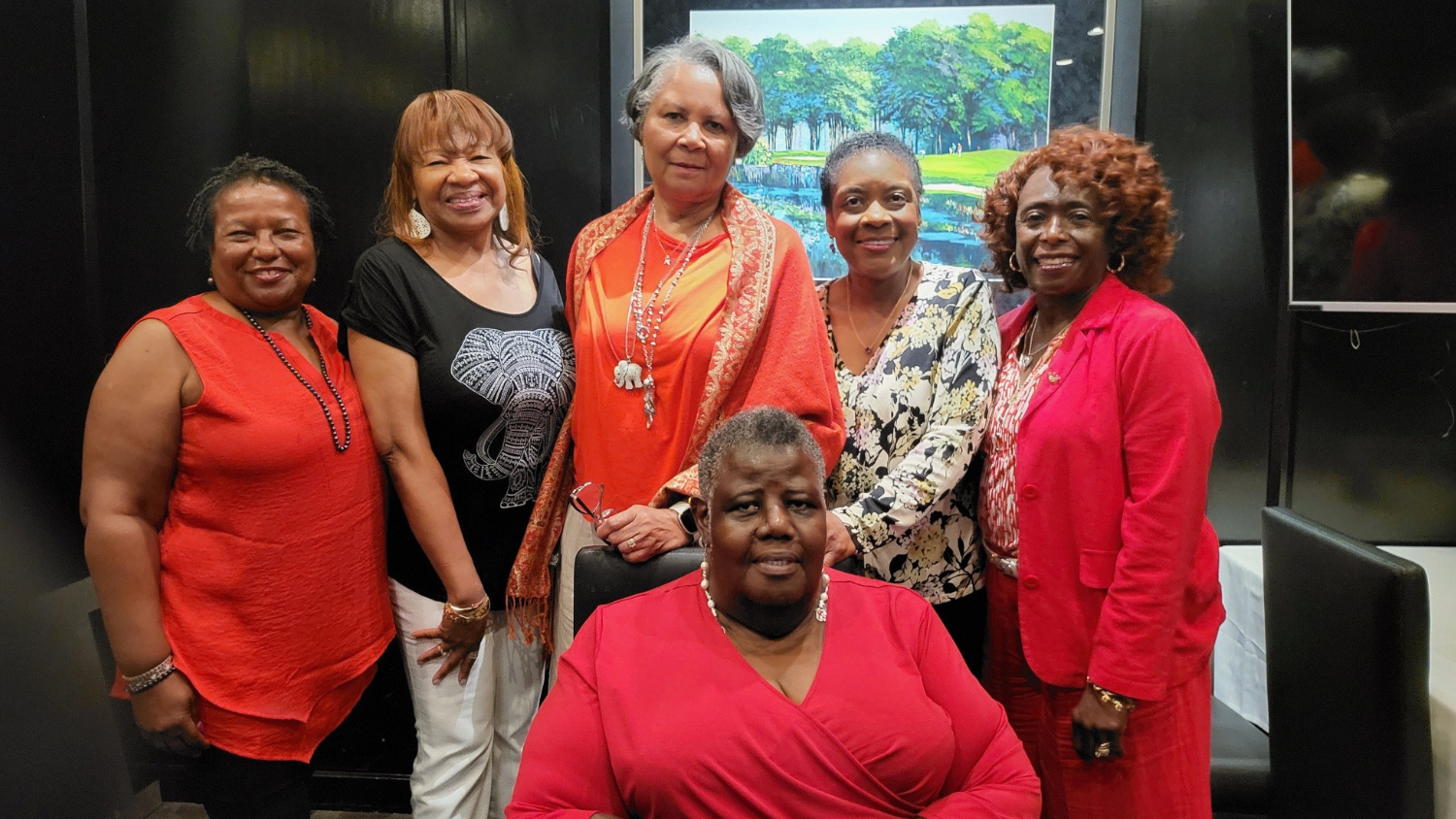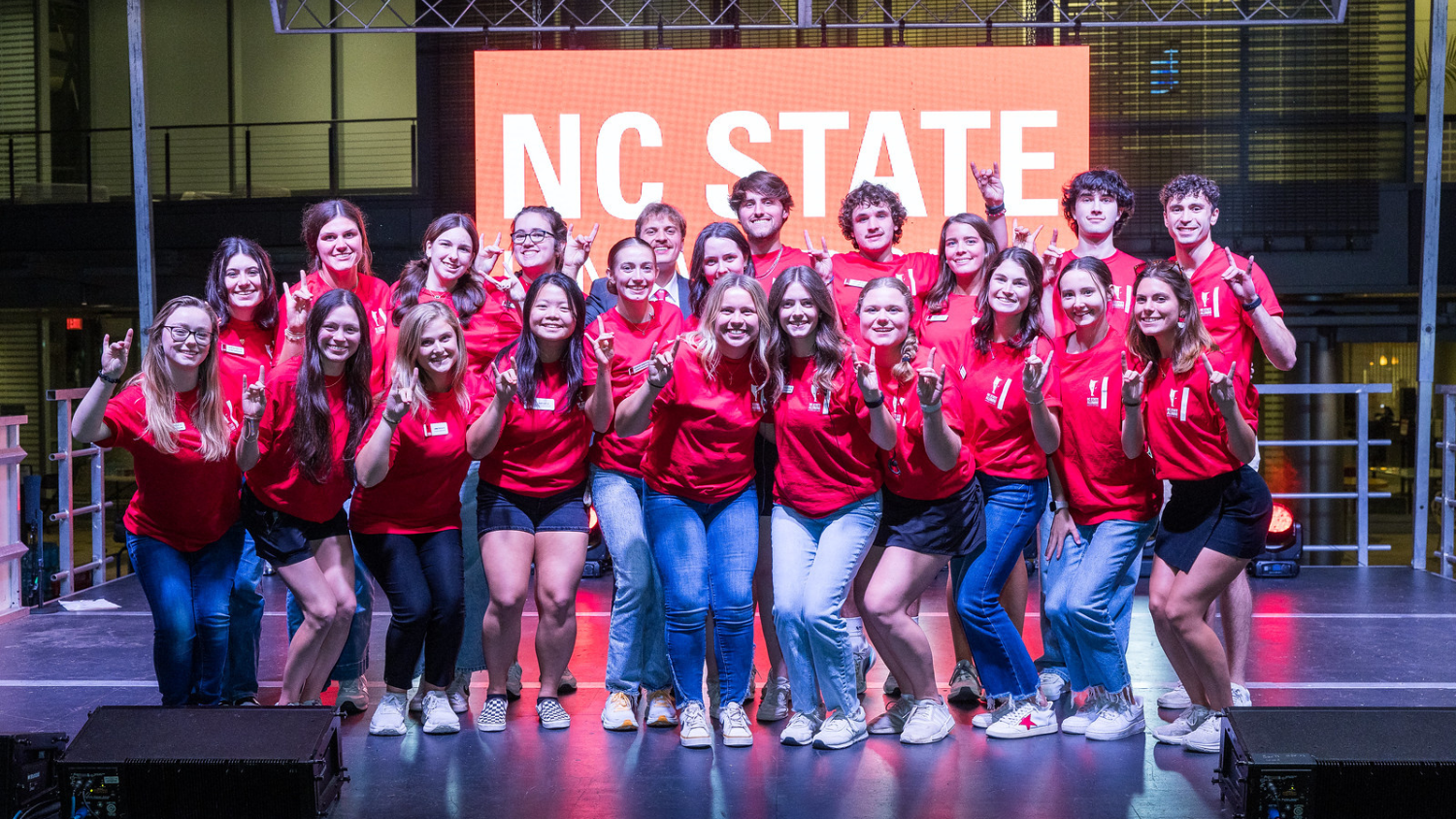First NC State African American Sorority Chapter Turns Fifty
Creating Community

Half a century ago, 10 women came together to charter the first chapter of an African American sorority on the NC State campus, establishing the Mu Omicron chapter of Delta Sigma Theta Sorority Inc. on October 25, 1975.
The chapter celebrates its golden anniversary during Red and White Week this year. Many of the charter members plan to attend the festivities, anticipating a weekend packed with food, fun, philanthropy, football and friends – both old and new.
“This 50th anniversary is going to be so phenomenal, because we were there at the very beginning.”
“This 50th anniversary is going to be so phenomenal, because we were there at the very beginning,” says charter member Jacqulynn Moore Sanders ’79. “To see how it’s grown. … It was breathtaking when we had our 40th to look out over the sea of women and think that it all started with what we did back in 1975. I don’t even know how many Mu Omicron members there are, but they are far and wide, and they’re doing good work to keep in touch with the chapter. I’m really excited and looking forward to the 50th.”
Chartering Mu Omicron
The first Black Greek Letter Organization at NC State was the Eta Omicron chapter of the Alpha Phi Alpha fraternity, chartered in 1971. The future Mu Omicron charter sisters were searching for a similar sense of community and camaraderie when they decided to create their own – by chartering the NC State chapter of Delta Sigma Theta Sorority Inc. The women found what they were looking for and more, cementing their own place in NC State history and building a legacy of scholarship, service, leadership and sisterhood that endures today.
All residents of Lee Hall, the women began meeting to discuss the project in the spring of 1975. With the help of the Raleigh Alumnae Chapter of Delta Sigma Theta Sorority Inc., the charter members were able to jump through all the organizational hoops and became official the following autumn.



“There was an initial sense of being a sisterhood, because this was something new for all of us and we had to hold each other accountable for learning the history,” says Sanders. “We were already close, but that bond grew tighter as we went through the process.” That process entailed committing to memory the sorority’s history, symbols and ideals while also planning for the chapter’s future.
As charter members, the women of Mu Omicron didn’t have the benefit of participating in a chapter’s traditions; there were no big sisters to show them the ropes, no inherited step show routines. But like the trailblazers they were, they created their own traditions to pass down to the women who followed. In 1976, Sanders served as dean of pledges as the women of the sorority became big sisters, welcoming their first pledge class, or line, and nearly doubling their number.
Sisterhood, Scholarship, Service
“That’s what the entire organization is about: promoting sisterhood, providing service to the university, the community, the nation and the world,” says Odom. “It’s a commitment that carries over. It’s not just what you do in college – it’s something you can do for the entirety of your life. Public service, sisterhood…as you get older, you really see how important it all is.”
It’s not just what you do in college – it’s something you can do for the entirety of your life.
Each line, or pledge class, takes on their own service project, contributing to the community while also keeping their grades up and creating memories with fellow sorors. One of the chapter’s first service projects was working with honor-grade inmates of a nearby minimum security women’s prison. Sisters of the newly-minted Mu Omicron chapter spent time with the incarcerated women, even hosting them for a reception on campus.
“We were able to give them a little glimpse of life outside of the prison walls,” said Odom. “Hopefully it gave them relief and a respite from that, and they saw that somebody cares. It really made an impact on me.”
The Mu Omicron charter members went on to impact the world in myriad ways after graduation, blazing their own paths to personal and professional success.
The Women of Mu Omicron
Shirley Lee Carr
Carr taught math at a junior high school before becoming a high school mathematics department chair. She then earned her Master of Science in Education, taking a position as mathematics instructional coach. Next, she received an Educational Specialist in Educational Administration and Supervision, becoming the director of an Alternative School, and was then promoted to the position of regional director of Alternative Schools for two counties in Georgia. She now considers herself “happily retired.”
Lenora Davis
Davis became a licensed practical nurse in 1978, then a registered nurse in 1990. She is now retired and enjoys traveling.
Aldra Lee Greene
Greene is retired from a career in consulting, program management and project management in the telecommunications, healthcare and financial services industries.
Katrina Todd McDuffie
After graduation, McDuffie received a Bachelor of Science in Medical Technology. She worked in the medical field, with positions ranging from bench technologist to management in the blood bank departments of both hospitals and private company labs. She is now retired and “enjoying every moment.”
Marilyn Truesdale Odom
After school, Odom built a career in the nonprofit world, earning her master’s degree from UNC Greensboro and finishing her career as vice president of youth services at the Winston-Salem YWCA. Now retired, she is active in her local Delta Sigma Theta Sorority Inc. alumnae chapter, where sisters work to offer scholarships, make international service trips and organize events such as voter registration drives.
Jacqulynn Moore Sanders
Though she majored in Textile Technology, Sanders found success in finance and accounting roles, returning to school to earn her MBA from Pfeiffer University. She retired in 2023 as a senior accounts receivables specialist for a pharmaceuticals company.
Genetta McDonald Williams
Williams worked for 16 years as a mental health specialist in the children’s program at a psychiatric hospital, followed by over 15 years as the youth director at her church, as well as the state youth supervisor for the Woman’s Baptist Home & Foreign Missionary Convention. She “accepted the call to preach the gospel,” earning her Master of Divinity degree from Campbell University School of Divinity. She says she is “currently preaching, teaching the Gospel and enjoying spending time with my family and working within my community.”
Deborah Bell Young
In 1977, Young became the first Black woman to earn a bachelor’s degree in civil engineering at NC State. She then became the first Black woman to earn a master’s degree in civil engineering-environmental engineering at the University of Pittsburgh, and also earned an MBA at Duke University. In addition to a high-powered career, she has also served as a member of the NC State Engineering Foundation Board of Directors, and is the first Black person to have served as the board’s president. She was honored with a Distinguished Engineering Alumni award in 2023.
ΩΩ
Cynthia Steele Exum and Wanda A. Boykin
Both Exum and Boykin have passed away, but their memory lives on; they are now at rest with their fellow sorors in what Delta Sigma Theta Sorority Inc. calls “the Omega Omega chapter.” In 1974 N.C. State established its first women’s basketball team. The team included two African American women. Exum was one of those women.
- Categories:


